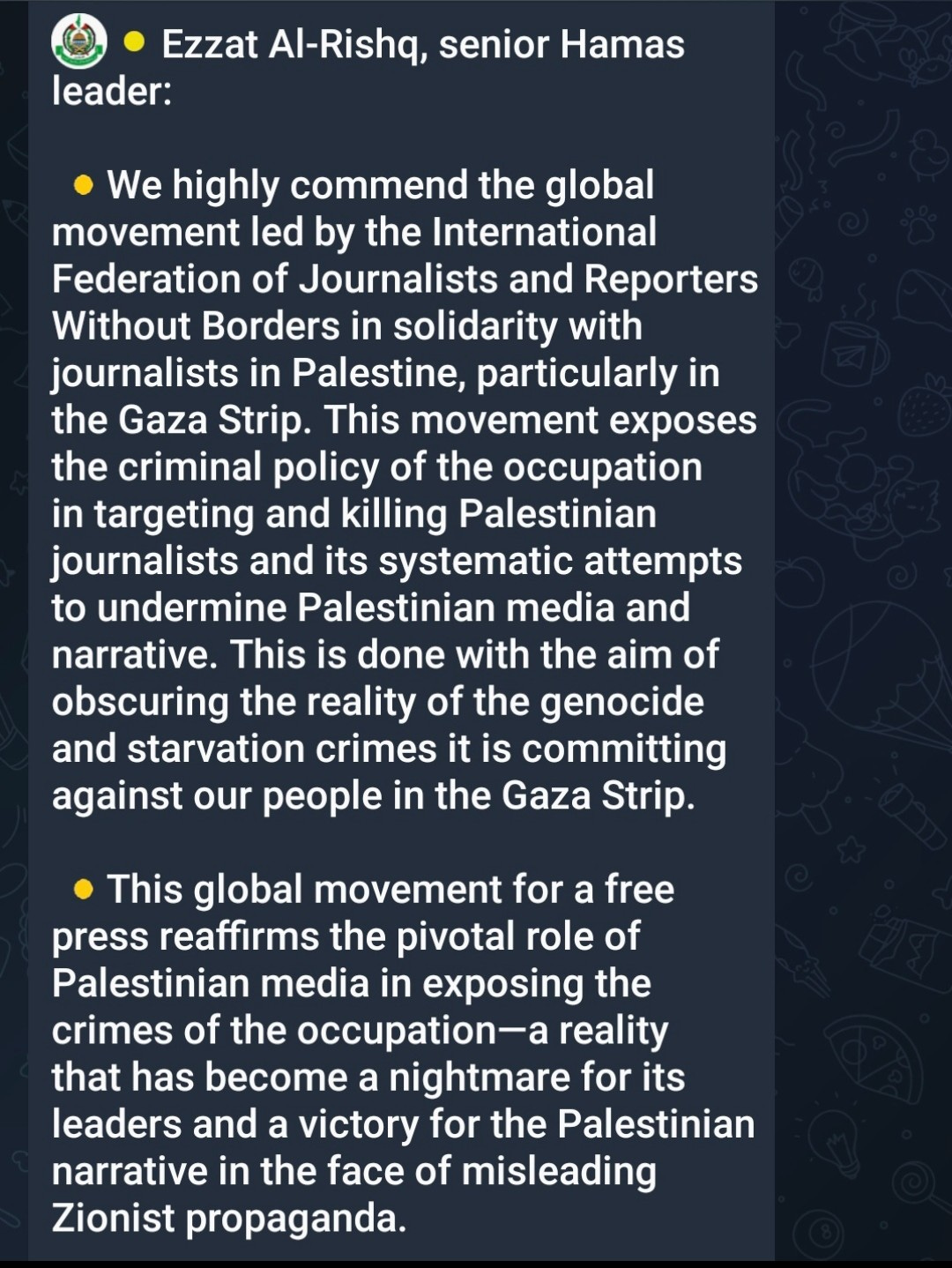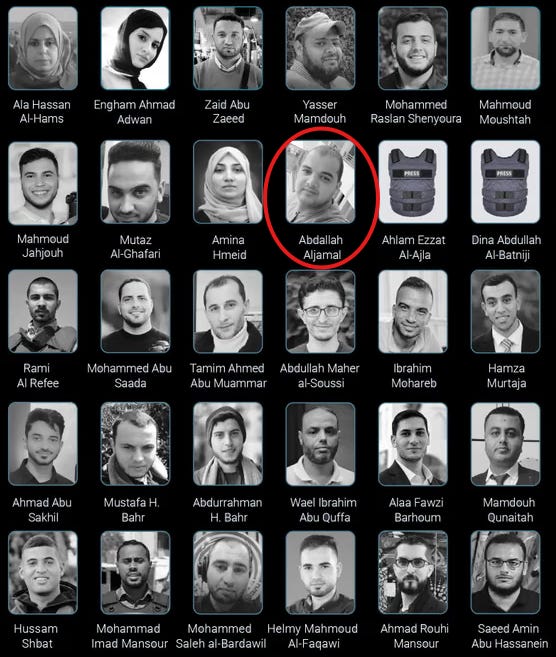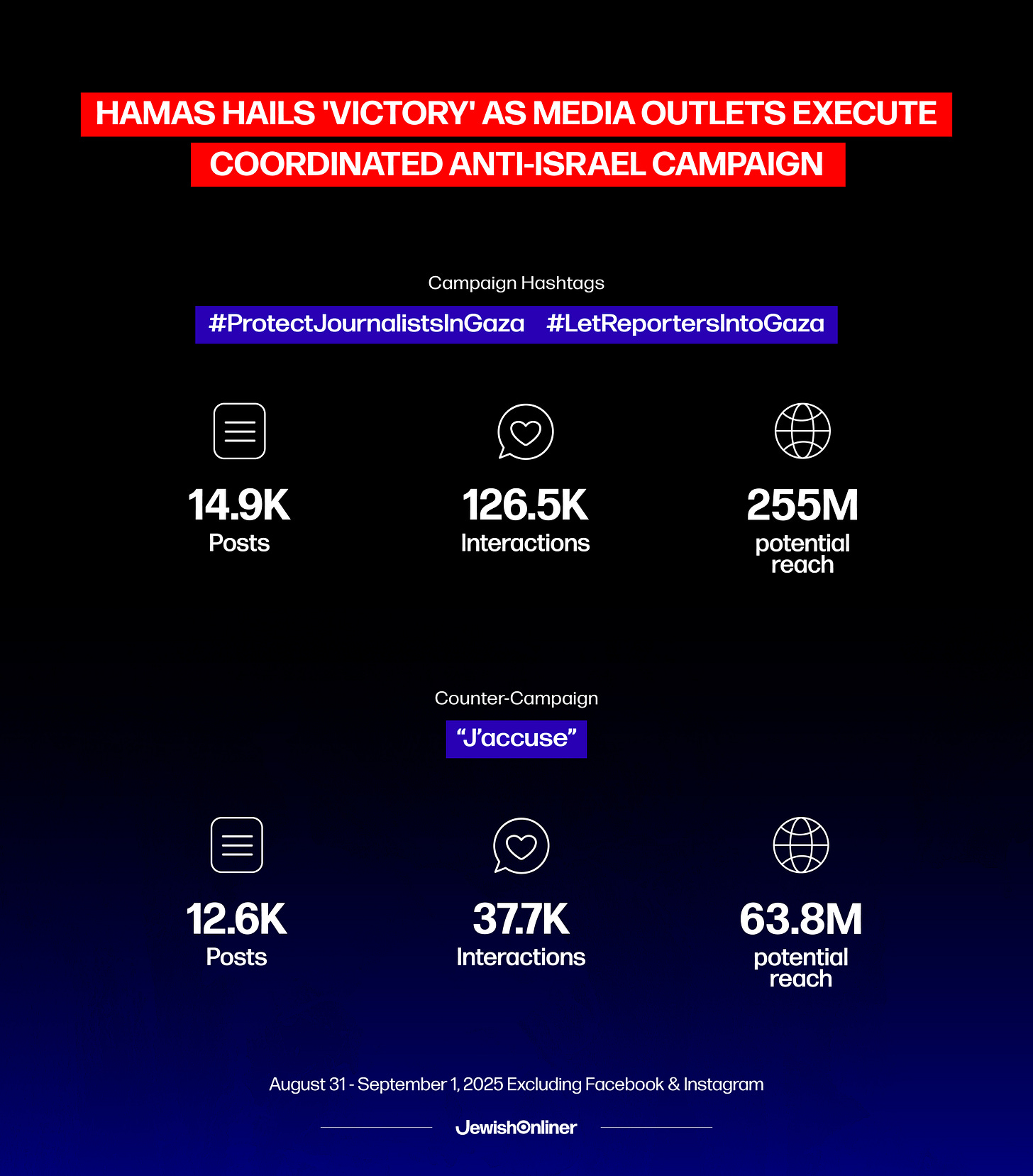Hamas Hails "Victory" as Media Outlets Execute Coordinated Anti-Israel Campaign
From Paris to New York, more than 150 outlets took part in a global September 1 push accusing Israel of systematically targeting journalists in Gaza, a media campaign Hamas hailed as a "victory"
In the 24 hours since Jewish Onliner published a report on leaked documents concerning a coordinated anti-Israel media campaign, major news organizations have issued varied responses. The documents exposed a coordinated international media campaign, orchestrated by Reporters Without Borders (RSF) and advocacy group Avaaz, involving approximately 150 media outlets across 50 countries.
The campaign, described by organizers as a "world-first" coordinated newsroom action to publish synchronized anti-Israel content on September 1st, intended to inaccurately portray Israel as systematically targeting journalists in Gaza and barring press freedom. Coverage has ranged from strong support to critical examination of editorial independence.
The revelation has prompted immediate reactions from Israel's government, participating media outlets, and Hamas officials, highlighting the campaign's far-reaching implications for journalistic integrity.
Social Media Campaign Reaches Millions
A social media analysis by Jewish Onliner found that results for #ProtectJournalistsInGaza and #LetReportersIntoGaza on X for the dates August 31 September 1 generated 14.9k posts, 126.5k engagements, and 255 million potential views, demonstrating the significant reach of the coordinated messaging effort.
The analysis also found that the counter-campaign using the keyword "j'accuse" had the results of 12.6k posts, 37.7k engagements, and 63.8 million potential views. The keyword references Émile Zola's famous 1898 open letter "J'Accuse...!" which exposed the antisemitic Dreyfus Affair scandal in France, where a Jewish army officer was falsely accused of treason.
In this context, critics are using the keyword "j'accuse" to publicly denounce what they view as a coordinated propaganda campaign disguised as journalism and to show that the media is complicit, drawing parallels to Zola's bold accusation against powerful institutions engaged in deception and bias.
Hamas Celebrates Campaign Success
i24 News Senior Middle East Correspondent Ariel Oseran reported that senior Hamas official Izzat Al-Risheq publicly thanked the participating media outlets, calling the coordinated campaign "a victory for the Palestinian narrative" - confirming fears about who ultimately benefits from such orchestrated efforts.

Israel’s Foreign Ministry Responds
Israel's Ministry of Foreign Affairs (MFA) shared an image of the Jewish Onliner’s article on its X account, giving official recognition to concerns about the coordinated nature of the September 1st campaign.
The New York Times Joins Campaign Messaging
In a striking example of the campaign's influence reaching major American media, The New York Times Editorial Board published "Israel's Gaza Media Ban Is Indefensible" on August 31st - one day before the official campaign launch.
The editorial echoed key campaign talking points, stating that "Israel's leaders are trying to conceal the war's full horror" and claiming "Some 200 journalists have been among the estimated 63,000 people killed since the Gaza war began — an overwhelming majority killed by the Israeli military." The timing and messaging alignment raised questions about whether the Times editorial was influenced by advance campaign materials.
Major Outlets Cover Without Critical Analysis
CNN reported on the campaign as legitimate journalism advocacy, stating: "Nearly 200 outlets from 50 countries will take part in the demonstration, according to organizers, with print newspapers running blacked-out front pages, broadcasters and radio stations interrupting their programming."
CNN's coverage made no mention of the coordinated scripts, standardized templates, or unified hashtag campaigns revealed in the leaked documents, instead presenting the effort as an organic journalistic response.
NPR and The Guardian also reported on the campaign, with both outlets mentioned among the participants in initial reports. The Guardian posted a list of names and an image showing the photos of 238 journalists and media workers they claim have been killed in the Israel-Hamas War.
However, many of the journalists on the list have previously been exposed as moonlighting for terror organizations such as Hamas. One example is Abdallah Aljamal, who does not appear on the list but was left in the accompanying photo. Aljamal was previously revealed to be a Hamas operative who held Israeli hostages in his home while also writing for the US-based outlet Palestine Chronicle.

Neither organization has issued detailed statements addressing the leaked documents that revealed the coordinated nature of the campaign since the Jewish Onliner report was published.
Support from French Media Outlets
Le Monde published an opinion piece supporting the campaign and demanding the “opening of Gaza to the international press.”
France 24 and Radio France Internationale (RFI) both confirmed their direct participation, with France 24 reporting that "more than forty French media outlets, including FRANCE 24 and our sister network RFI, are signing on to the international movement initiated by Reporters Without Borders (RSF) and Avaaz."
Ongoing Implications
As the story continues to develop, media organizations face mounting pressure to address questions about editorial independence and the role of external advocacy groups in shaping news coverage. The Hamas official's public celebration of the campaign as a "victory for the Palestinian narrative" has intensified scrutiny of the participating outlets' decision-making processes.
The revelation has also prompted broader discussions within journalism circles about the difference between legitimate press freedom advocacy and coordinated propaganda campaigns disguised as independent journalism. Such coordinated campaigns reflect a troubling systemic bias where outlets abandon their watchdog role to advance predetermined political narratives.



